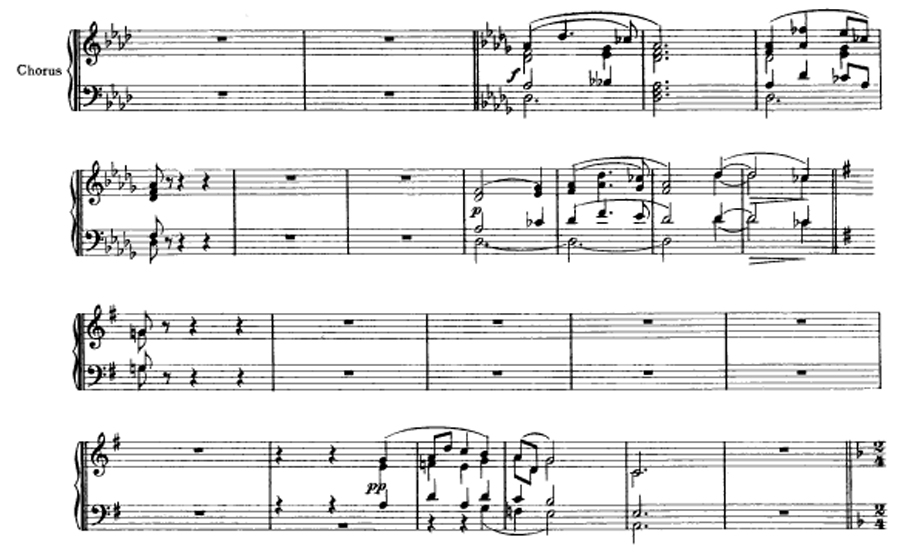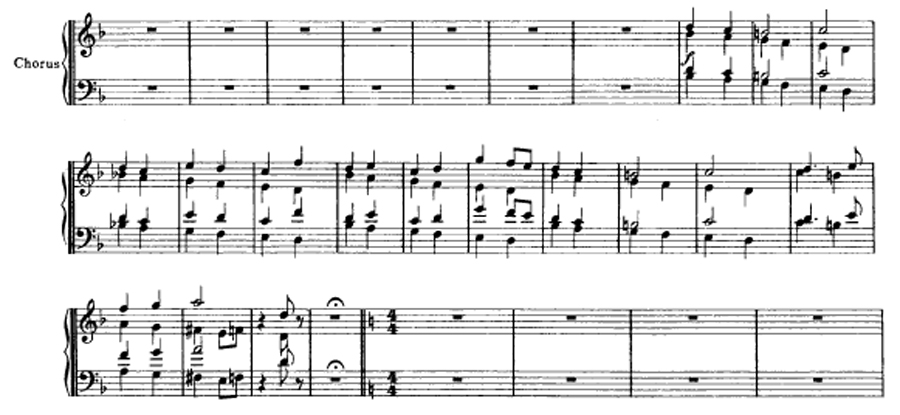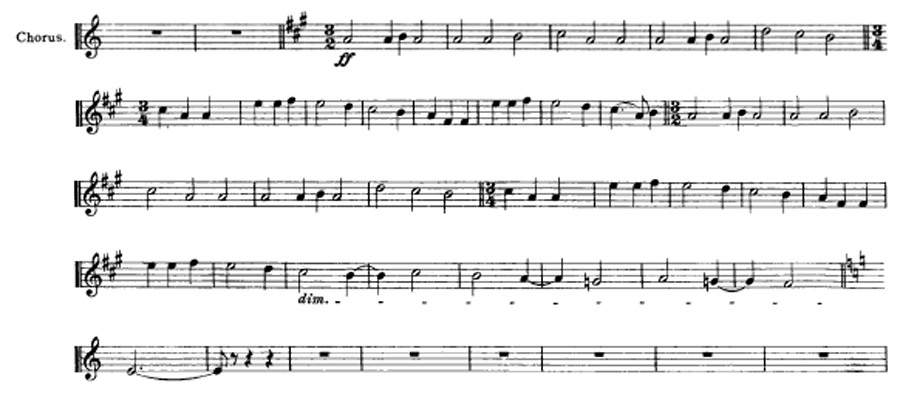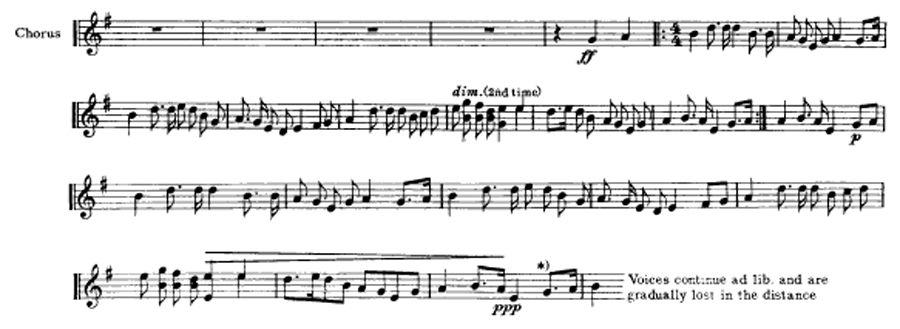Dramatic Vocalise Database
Ralph Vaughan Williams (1872–1958)
Old King Cole (1923)
Ballet for orchestra and opt. chorus, scenario by Mrs. Edward Vulliamy in association with the composer. First performed in Cambridge on 5 June 1923, conducted by Boris Ord. Published in 1924.1
Michael Kennedy, The Works of Ralph Vaughan Williams, 2nd ed. (Oxford: Oxford University Press, 1980), 162–3:
[A]s first president of the English Folk Dance Society’s branch at Cambridge, where folk dancing was enjoying a vogue, he welcomed the invitation to write a folk-ballet for the 1923 Festival of British Music. . . . Vaughan Williams’s ballet Old King Cole was performed out of doors on the grass of Nevile’s Court on 5 and 7 June. The weather was fine and, the Manchester Guardian said, the ballet ‘evoked great enthusiasm. . . .’
There were no hitches, which is astonishing because Vaughan Williams was still scoring the work at the dress rehearsal. He had written to Bernhard Ord, as Boris Ord was known at this time, when, at the age of twenty-six, he had been appointed Fellow of King’s, on 15 April 1923:
Dear Ord,
(a) I don't dare to undertake anything more—how I shall find time to score the old Ballet passes my comprehension. (By the way, I shall score it for ordinary orch. fairly thick and let it take its chance out of doors.)
(b) As regards Wassail Song—I meant ♩ = 168 or so, vivace refers to style (this is a good lot quicker than the man sang it to me)—and I also like the quick pace when the E.S. [English Singers] do it—with the chorus it sounds a bit too tricky quick.
(c) Congratulations on your fellowship.
Yours sincerely,
R. Vaughan Williams.
The music of the ballet is not a major work but it is fun, and from the solo violin music it is more than likely that the Concerto Accademico stirred in Vaughan Williams’s mind.
Michael Kennedy, The Works of Ralph Vaughan Williams, 2nd ed. (Oxford: Oxford University Press, 1980), 178–9:
The Old King Cole ballet music is a considerably more elaborate concoction which cannot entirely be dismissed as a light-weight ‘folky’ work of no great significance. The humour is more subtly handled than in The Wasps, although the consecutive fifths as bass harmony to the ‘King Cole’ tune probably upset the Cambridge professors more than they worried anybody else. The folk tunes are set in common time or in 6/8 jig rhythms, but there is nothing commonplace about the methods. Moreover the scoring has a ‘bite’ to it which struck home with E. J. Dent who, writing in The Nation and the Athenaeum of 30 June 1923, called the ballet ‘a new composition by Vaughan Williams in his most ruthlessly modern style’. Since the days of The Wasps, Dent remarked, ‘we have heard the Sacre du Printemps, and apparently Dr. Vaughan Williams has heard it, too.’ It is not easy to deduce from the score how Dent arrived at this conclusion, but there is no doubt that Old King Cole has some importance in the genesis of Job, for the effectiveness of the old dances must have set Vaughan Williams thinking of more ambitious ventures of this kind. Dent’s article continued: ‘Whether traditional English steps and figures could be made the foundation of a highly elaborated ballet is a question which I must leave to the specialists in choreography. . .. There were some English dancers who startled the crowd at the Frankfort fair some three centuries ago; were they frightened of turning their native folk-dances into a ballet?’ Apart from its charm and vivacity, two points from Old King Cole should be noted. First, the way in which the composer demonstrated a kinship between the nursery tune and ‘Dives and Lazarus’:

and, secondly, the beautiful episode of the Second Fiddler, with his romantic violin solo based on ‘Bold Young Farmer’, one of many such rapturous passages throughout Vaughan Williams’s output.

Michael Kennedy, The Works of Ralph Vaughan Williams, 2nd ed. (Oxford: Oxford University Press, 1980), 189:
One event in 1925 which was to have the value of rarity was Vaughan Williams’s first appearance as conductor of his own music on a gramophone record. He recorded the overture to The Wasps and the music to Old King Cole on pre-electric Vocalion with what is described on the label as ‘The Aeolian Orchestra’. Although he took a close interest in recordings of his music, attending the long and sometimes tedious sessions, ready with advice if it was sought, only once more did he perpetuate his own conducting. This was in 1937 with the B.B.C. Symphony Orchestra when he made what in most respects is still the most exciting recording of the Fourth Symphony, as it certainly is the best interpretation.

Vaughan Williams, Old King Cole, “Entrance of Court Singers,” mm. 27–47 2
[Full score images]

Vaughan Williams, Old King Cole, “KING smokes,” mm. 172–95 3
[Full score images]

Vaughan Williams, Old King Cole, “The bowl is carried to the KING in solemn procession,” mm. 266–85 4
[Full score images]

Vaughan Williams, Old King Cole, “Men dance in circles,” mm. 340–62 5
[Full score images]

Vaughan Williams, Old King Cole, At end of Folk Song: “Bold Young Farmer,” mm. 387–409 6
[Full score images]

Vaughan Williams, Old King Cole, At end of Folk Song: “Jolly Thresherman,” mm. 443–70 7
[Full score images]

Vaughan Williams, Old King Cole, Example 7, mm. 564–604 8
[Full score images]

Vaughan Williams, Old King Cole, Example 8, mm. 687–709 9
[Full score images]
Examples | Comments |
| Entrance of Court Singers |
| KING smokes |
| The bowl is carried to the KING in solemn procession |
| Men dance in circles |
| At end of Folk Song: “Bold Young Farmer” |
| At end of Folk Song: “Jolly Thresherman” |